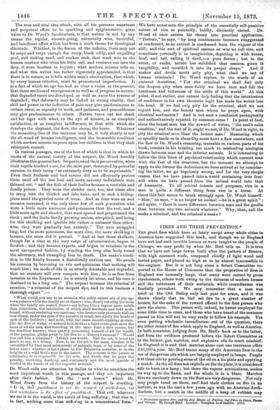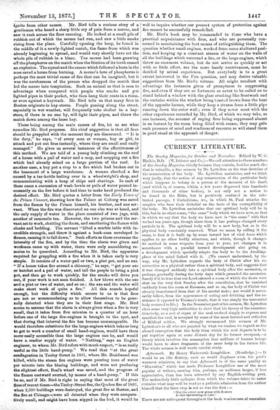FIRES AND THEIR _PREVENTION.*
Tux great fires which have so lately swept away whole chisels: America have suggested this book, and though we in England have not had such terrible lessons as were taught to the people of Chicago, we may profit by what Mr. Bird tells us. It is true that we have not large towns built after the pattern of Boston, with high mansard roofs, composed chiefly of light wood and tarred paper, and placed so high as to be almost inaccessible to fire-engines. But it is not long since a Select Committee te- ported to the House of Commons that the proportion of fires in England was unusually large, that many were caused by gross carelessness, others were owing to the thinness of modern houses and the rottenness of their materials, while incendiarism was fearfully prevalent. We may remember that a man was tried at the Old Bailey only last year for arson, and it was shown clearly that he had set fire to a great number of houses, for the sake of the reward offered to the first person who gave the alarm. This person will, indeed, be better employed for some little time to come, and those who have heard of the sentence passed on him will not be very ready to follow his example. Yet even putting wholesale incendiarism out of the question, there are other causes of fire which apply to England, as well as America. In both countries, judging from Mr. Bird's book as to the'latter, and from the evidence produced before the Select Committee as to the former, gas, matches, and explosive oils do much mischief. In England it is said that matches alone cost one insurance office £10,000 a year. Mr. Bird traces many of the American fires to the use of dangerous oils which are largely employed in lamps. People test these oils by pouring some of the oil on a tin plate and applying a match. As the oil does not explode on the tin plate, it is considered safe to burn in a lamp ; but there the vapour accumulates, makes its way np to the flame, and the whole is in a blaze. Matches thrown carelessly down on the floor are very dangerous. Not only may people tread on them, and find their clothes on fire in an instant, as was the case a few years ago with an Austrian Arch- duchess, but a match in the middle of a heap of rubbish may -* Protection against Fire, and the Beat Mesas of Putting Out Fires in Cities, rowan and Villages. By Joseph Bird. London : Sampson Low audCo. 1873.
ignite from other causes. Mr. Bird tells a carious story of a gentleman who beard a sharp little cry of pain from a mouse, and saw it rush across the floor sneezing. He looked at a small pile of rubbish out of which the mouse had run, and saw a little smoke rising from the place. Carefully opening the heap, he found in the middle of it a newly-lighted match, the flame from which was already beginning to spread, and would very shortly have set the whole pile of rubbish in a blaze. The mouse had been gnawing off the phosphorus on the match when the friction of its teeth caused an explosion. The squeal and the sneeze which followed a burn in the nose saved a house from burning. A mouse's love of phosphorus is perhaps the most trivial cause of fire that can be imagined, but it was the carelessness of the person who dropped the match that led the mouse into temptation. Such an animal as that is seen to advantage when compared with people who smoke and put lighted pipes in their pocket, who then hang their coats in a room, or even against a haystack. Mr. Bird tells us that many fires in Boston originate in hay-stores. People passing along the street, especially in wet weather, will frequently take shelter in a hay- store, if there is no one by, will light their pipes, and throw the match down among the loose hay.
These being among the main causes of fire, let us see what remedies Mr. Bird proposes. His chief suggestion is that all fires should be grappled with the moment they are discovered. " It is the duty," he says, of every man or woman, boy or girl, to attack and put out fires instantly, where they are small and easily managed." He gives us several instances of the effectiveness of this method. We are told of a young lady climbing on the roof of a house with a pail of water and a mop, and mopping out a fire which had already seized on a large portion of the roof. In another case, a boy put a atop to a fire which had broken out in the basement of a large warehouse. A woman checked a fire caused by a tar-kettle boiling over in a wheelwright's shop, and communicating with a heap of chips and shavings. In each of these cases a succession of wash-bowls or pails of water poured in- cessantly on the fire before it had time to make head produced the desired effect. Mr. Bird quotes a letter from the Early Years of the Prince Consort, showing how the Palace at Coburg was saved from the flames by the Prince himself, his brother, and one ser- vant. When the fire was discovered no one else was at hand, and the only supply of water in the place consisted of two jugs, with another of camomile tea. However, the two princes and the ser- vent set to work, shutting the doors, and smothering the flames with eloake and bedding. The servant "lifted a marble table with in- credible strength, and threw it against a book-case enveloped in dames, causing it to fall down." Such efforts as these overcame the intensity of the fire, and by the time the alarm was given and workmen came up with water, there were only smouldering re- mains to be quenched. According to Mr. Bird, the apparatus required for grappling with a fire when it is taken early is very simple.. It consists of a water-pail or two, a pint pot, and an axe. "If a house takes fire around a chimney," he says, " get your axe or hatchet and a pail of water, and tell the people to bring a pint pot, and then go to work quickly, for the smoke will drive you oat, if your work is not soon finished. A few blows with the axe and a pint or two of water, and so on ; the axe and the water will make short work of quite a fire." All this sounds hopeful enough, but the difficulty which occurs to us is that fires are not so accommodating as to allow themselves to be gene- rally detected when they are in their first stage. Mr. Bird seems to assume that the alarm is always given when a fire is very small, that it takes from five minutes to a quarter of an hour before one of the large fire-engines is brought to the spot, and that during that interval the fire has become unmanageable. He would therefore substitute for the large engines which take so long
to get to work a number of small hand-engines, would have them more easily accessible than the large engines can be, and would have a readier supply of water. "Nothing," says an English engineer, to whom Mr. Bird refers with much respect, " is so really useful as the little hand-pump." We read that "at the great conflagration in Tooley Street in 1861, where Mr. Braidwood was killed, while the steam fire engines were pouring tons of water per minute into the blazing buildings, and were not producing the slightest effect, Beal's wharf was saved, and the progress of the flames eastward averted, by means of a hand-pump." if this bs so, and if Mr. Bird is right in saying that most of the great
ftretinfrecent times—theTooley-Street fire, the Quebec fire of 1866, when 2,500 buildings were destroyed, the great fire at Boston, and the fire at Chicago—were all detected when they were compara- tively small, and might have been_nipped in the bud, it would be
well to inquire whether our present system of protection against fire cannot be successfully remodelled.
Mr. Bird's book may be :commended to those who have a practical acquaintance with fires, and who are personally con- cerned in ascertaining the best means of extinguishing them. The question whether small engines, worked from some sheltered posi- tion, and keeping up a constant stream of water on the walls of all the buildings which surround a fire, or the large engines, which throw an enormous volume, but do not arrive so quickly or act with so little effort, are the more handy contrivances, must be decided by actual experience. But everybody is to a groat extent interested in the Fire question, and may derive valuable suggestions from Mr. Bird's volume. All might recollect with advantage the instances given of promptness in suppressing fire, and even if they are so fortunate as never to be called on to stand behind a window with the glass cracking like froatwork and the curtains within the window being toasted brown from the heat of the opposite houses, while they keep a stream from a little pipe running down the outer wall ; even if they never meet with the other experiences recorded by Mr. Bird, of which we may take, as one instance, the account of raging fires being suppressed almost in an instant by the room being filled with steam, they may gain such presence of mind and readiness of resource as will stand them in good stead at the approach of danger.



































 Previous page
Previous page